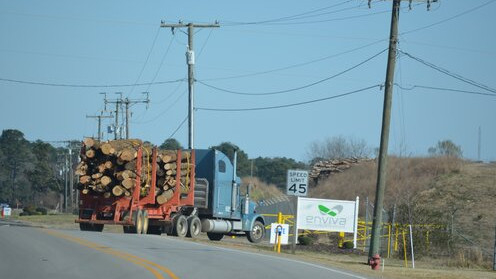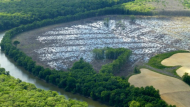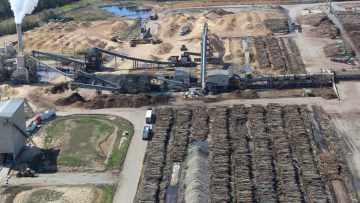Company – On record
This profile is no longer actively maintained, with the information now possibly out of dateBankTrack & Environmental Paper Network

Company – On record
This profile is no longer actively maintained, with the information now possibly out of dateBankTrack & Environmental Paper Network
Why this profile?
As a pellet manufacturer, Enviva sources wood from native hardwood forests in an area designated as a global biodiversity hotspot in the southeastern United States. In addition, large diameter wood known to be high in carbon has been found in Enviva's supply chains. Through destructive logging practices, Enviva is contributing to the destruction of irreplaceable forests and increasing greenhouse gas emissions.
| Sectors | Biomass Electric Power Generation |
| Headquarters |
|
| Ownership |
listed on NYSE
See Enviva’s shareholders here. |
| Subsidiaries |
|
| Website | https://www.envivabiomass.com/ |
Enviva is a US-based company and the world's largest producer of industrial wood pellets. It operates ten manufacturing plants across six Southeast US states and six terminal facilities where they ship pellets worldwide. It’s three biggest mills, located in Ahoskie, NC, Northampton, NC and Southampton, VA had a combined production capacity of 1.4 million metric tons per year when constructed, but now have an annual production capacity of over 1.9 million metric tons since receiving authorisation permits to expand two of the mills. The company makes and exports wood pellets to utility companies in Europe like RWE in the Netherlands, Drax in the UK, and Orsted in Denmark. Enviva’s newest corporate office was opened in Tokyo, Japan as the company seeks to serve the growing biomass industry in Japan and South Korea.
Impact on human rights and communities
Environmental injustice: Studies have found that a wood pellet manufacturing plant in southeastern US is 50% more likely to located in a so-called “Environmental Justice community”, defined as a county where the poverty level is below the state median poverty level and at least 25% of the population is Black, Indigenous, or People of Colour (BIPOC). Most of Enviva’s pellet plants are sited in locations where the wood dust, air pollution and noise from their operations disproportionately affect black and low-income communities, who are often already exposed to high levels of industrial pollution and social deprivation. In Hamlet, North Carolina, there are only 6,500 residents and five polluting companies, including an Enviva wood pellet plant.
Air pollution: A 2018 report by the Environmental Integrity Project found that 21 wood pellet mills exporting to the EU, including those operated by Enviva, emit thousands of tons of particulate matter, carbon monoxide, nitrogen oxides (smog), and volatile organic compounds per year. These are all associated with a range of illnesses, including respiratory and heart disease and cancer. The report also finds that many of these wood pellet facilities have violated air permit limits and highlighted frequent fires and explosions caused by wood dust combustion at pellet mills.
Impact on climate
Not only does the demand for wood pellets to burn for energy impact forests, but it also excerbates the climate crisis. Burning biomass from forests creates more carbon emissions than burning coal, per unit of energy, and the increased carbon dioxide concentrations persist in the atmosphere for decades. In addition, forests offer crucial protection from extreme weather events such as floods and droughts that are becoming increasingly common due to climate change, but the demand for wood pellets for energy is driving forests across the US to be cut down.
Impact on nature and environment
Destructive sourcing practices: Since 2013, multiple investigations have found that Enviva’s pellet mills routinely source whole trees and other large-diameter wood rather than “residues” or “waste” from forests, and that many of these trees are taken from clearcuts of ecologically valuable and highly biodiverse hardwood or wetland forests. These forests are located in the North American Coastal Plain global biodiversity hotspot and provide key habitats to many at-risk species, purify the air and improve water quality, and store large amounts of carbon.
Monoculture plantations: Enviva sources wood from coastal hardwood forests as well as from monoculture pine plantations. The demand for wood pellets is increasing the trend to plant monoculture plantations. However, these have harmful effects on ecosystems and biodiversity. Monoculture plantations hardly provide habitat for wildlife and deplete soil fertility and freshwater. In addition, industrial tree plantations are also associated with an increased risk for the occurrence of fires.
Impact on wildlife and biodiversity: The North American coastal plain where Enviva harvests timber has recently been recognised as a global biodiversity hotspot. The Southeast is unique in having more than 1,500 endemic vascular plants (species found nowhere else in the world) while experiencing more than 70 per cent habitat loss. Intensive logging is a major threat to biodiversity. The production of wood pellets uses more wood than other types of logging, which means that less wood is left on the ground to support forest regrowth. This affects soil health and leads to a significant loss of habitat for wildlife. Forest-dependent species such as certain birds depend on dead and old trees for their habitat. Removing trees, branches, roots and dead wood from forests for biomass destroys habitat, including nesting and breeding sites, for thousands of bird species. Once a forest has been cut down, it takes decades, if not centuries, for it to grow back to its original ecosystem productivity. Moreover, it takes decades to centuries for a regenerating forest to regain its ecosystem productivity once it has been cut down.
Impact on pandemics
Wood biomass is associated with high rates of deforestation as well as monocultures of various crops. There is a growing body of evidence that shows the connection between deforestation and an increased risk for disease outbreaks and pandemics. For example, monocultures like eucalyptus plantations reduce biodiversity leaving species like rats and mosquitoes, which are more likely to spread dangerous pathogens, to thrive. This biodiversity decline results in a loss of natural disease regulation and poses a risk for human, animal and environmental health.
The banks listed below provided credit (loans and underwriting) to Enviva and/or its subsidiaries between 2016 and 2022. In addition, those commercial banks that hold over USD 1 million in Enviva shares have been listed below. For a list of Enviva's top shareholders, see here.
Applicable norms and standards
2024
2024-03-12 00:00:00 | Enviva files for bankrupcy
On March 12, Enviva filed for bankruptcy under Chapter 11 of the United States Bankruptcy Code. Chapter 11 bankruptcy cases are commonly known as "reorganization" bankruptcies. In these cases, the debtor puts forth a reorganization plan to sustain its business operations and gradually repay creditors. The 8-K form was submitted to the US Securities and Exchange Commission (SEC) on March 12, 2024, outlining the details of the restructuring. As part of the bankruptcy filing, Enviva has secured commitments for a $500 million Debtor In Possession (DIP) credit facility and reached two restructuring support agreements (RSA) with its creditors (lenders and bondholders). In Enviva's official statement issued on the same day, the company said that it is restructuring plan is expected to reduce its debt by approximately $1.0 billion.
2024-01-11 00:00:00 | Financial & legal troubles
Enviva has seen its share price crash in recent months. Early January its stock price was 80 cents, which is a 99% down from its peak of USD 87 per share (April 2022). Factors that could have contributed to this downfall: collapsing price for wood pellets, long-term contracts that lock Enviva into deals with customers at low prices, high interest rates that makes its loans more expensive to service, and operational issues at some of its plants. See under 'articles' for more information.
Next to these financial troubles, there are now three pending lawsuits against Enviva:
- Fagan v. Enviva, Inc., 8:22-cv-02844 (D. Md. 2022) - This class-action shareholder lawsuit alleges securities fraud based on misrepresentations about environmental attributes (such as sourcing practices and GHG emissions), and the impact to share prices when the truth about these issues was revealed in the Blue Orca report. Enviva filed a motion to dismiss, which has been fully briefed and is awaiting a decision by the judge.
- Dhatt v. Enviva, Inc., 8:23-cv-02474 (D. Md. 2023) - Another class-action shareholder lawsuit. It alleges securities fraud based on misrepresentations about financial conditions. Right now, there are several motions by investors seeking to serve as the lead plaintiff.
- Browning v. Alexander, 23-cv-03293 (D. Md. 2023) - This is a shareholder derivative complaint against individual members of Enviva’s board, reasserting many of the allegations of the previous two lawsuits and alleging brief of fiduciary duty, gross mismanagement, waste of corporate assets, unjust enrichment, and securities fraud.
2022
2022-11-19 00:00:00 | Class action lawsuit alleges wood pellet maker Enviva is “engaged in textbook greenwashing”
In November 2022, a class action lawsuit was filed against Enviva, accused of making false and misleading statements about the environmental sustainability of their wood pellet production and procurement, as well as misleading statements about their finances. The suit comes after a Blue Orca Capital report condemning the company’s greenwashing of its polluting activities, which even receive European subsidies.
2022-10-12 00:00:00 | Investor short sold Enviva stock over greenwashing
On October 12, 2022, Blue Orca published a report which alleged, among other things, that satellite imagery indicated that, in many instances, Enviva is “procuring wood from the widely condemned practice of clear-cutting,” or removing full swaths of forest, and further revealed that two former senior Enviva executives “unequivocally stated that [the Company] sources wood from clear-cutting.” The activist investment firm stated that Enviva is "flagrantly greenwashing its wood procurement" and therefore shorted its stockholding. On this news, Enviva’s stock fell as much as 20.5% during intraday trading on October 12, 2022. Enviva has publicly denied the findings of the report. Following the report and on behalf of investors, the law offices of Frank R. Cruz announced that they would investigate Enviva's possible violations of federal securities law.



